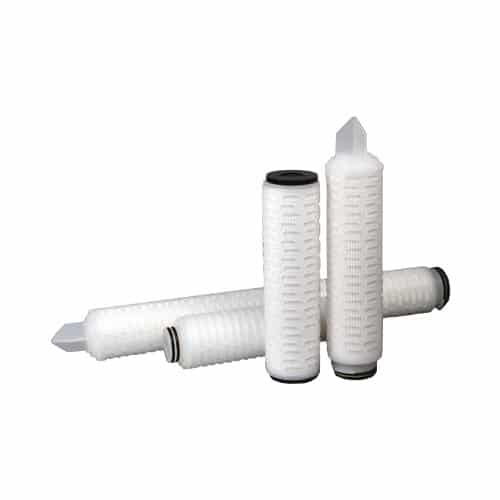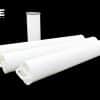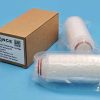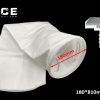Exploring the Essential Pleated Filter Cartridge Materials: The Key to Superior Filtration

Introduction
Pleated filter cartridges are integral components in various industries, including water treatment, pharmaceuticals, and food processing, where filtration efficiency and durability are paramount. The effectiveness of these cartridges largely depends on the materials used in their construction. In this article, we will explore the different materials commonly used in pleated filter cartridges, their unique properties, and how choosing the right material can enhance the performance and longevity of your filtration systems.
Why Material Matters in Pleated Filter Cartridges
- Filtration EfficiencyThe primary function of a pleated filter cartridge is to remove contaminants from liquids or gases. The material used in the filter media plays a critical role in determining the filtration efficiency. Different materials have varying pore sizes, surface areas, and chemical compatibilities, which affect their ability to capture particles of different sizes and types.
For instance, polypropylene is widely used for its excellent chemical resistance and ability to filter fine particles, making it ideal for applications in water treatment and chemical processing. On the other hand, polyester offers high tensile strength and durability, making it suitable for more demanding filtration environments.
- Durability and LongevityThe durability of a pleated filter cartridge is directly influenced by the material used. In industrial applications where filters are exposed to harsh chemicals, high temperatures, or abrasive particles, the material must withstand these conditions without degrading or losing effectiveness. Selecting the right material ensures that the filter cartridge maintains its structural integrity and continues to perform efficiently over an extended period.
Materials like fiberglass, for example, are known for their high-temperature resistance and mechanical strength, making them ideal for applications in high-temperature environments or where mechanical stress is a concern. By choosing a durable material, businesses can reduce the frequency of filter replacements, leading to lower maintenance costs and less downtime.
- Chemical CompatibilityIn industries where the filtration of aggressive chemicals is required, the material’s chemical compatibility is crucial. Using a material that is resistant to the chemicals being filtered prevents degradation of the filter media, which could compromise filtration performance and lead to contamination.
For example, polyvinylidene fluoride (PVDF) is often chosen for its excellent resistance to harsh chemicals and solvents, making it suitable for applications in the chemical and pharmaceutical industries. By selecting a material with the appropriate chemical resistance, businesses can ensure that their filtration systems remain effective and reliable in challenging environments.
- Cost-EffectivenessThe material used in pleated filter cartridges also impacts the overall cost. While high-performance materials may come at a higher initial cost, they often provide longer service life and better filtration efficiency, leading to cost savings in the long run. Balancing the upfront cost with the material’s durability and effectiveness is key to achieving cost-effective filtration solutions.
For applications where the filtered fluid or gas is less aggressive, cost-effective materials like cellulose or polyester may be sufficient. These materials offer good filtration performance at a lower cost, making them a practical choice for less demanding applications.
Common Materials Used in Pleated Filter Cartridges
- Polypropylene (PP)Polypropylene is one of the most commonly used materials in pleated filter cartridges due to its excellent chemical resistance, high filtration efficiency, and cost-effectiveness. It is resistant to a wide range of chemicals, including acids, alkalis, and solvents, making it ideal for water treatment, chemical processing, and food and beverage applications.
Polypropylene filter cartridges are available in various micron ratings, allowing them to capture particles of different sizes. They are also thermally bonded, which enhances their structural integrity and prevents media migration. This material’s versatility and reliability make it a popular choice for a wide range of filtration needs.
- Polyester (PET)Polyester is another widely used material, known for its high tensile strength, durability, and resistance to environmental factors such as moisture, UV light, and mildew. Polyester pleated filter cartridges are commonly used in HVAC systems, dust collection, and industrial filtration applications where mechanical strength and durability are essential.
Polyester’s resilience to environmental factors makes it suitable for outdoor and high-humidity environments. It is also a cost-effective option for applications where chemical exposure is minimal, providing a balance between performance and affordability.
- FiberglassFiberglass is known for its high-temperature resistance and mechanical strength, making it suitable for applications in extreme environments. Fiberglass pleated filter cartridges are often used in high-temperature filtration, gas turbines, and industrial processes where filters must withstand harsh conditions without degrading.
The high strength-to-weight ratio of fiberglass allows for the construction of durable filter cartridges that can handle heavy loads and high flow rates. This material is particularly beneficial in applications where maintaining filtration efficiency at elevated temperatures is critical.
- Polyvinylidene Fluoride (PVDF)PVDF is a high-performance material known for its exceptional chemical resistance, thermal stability, and UV resistance. It is often used in pleated filter cartridges for applications involving aggressive chemicals, solvents, and high temperatures, such as in the pharmaceutical, chemical, and semiconductor industries.
PVDF’s low permeability to gases and liquids, combined with its ability to withstand harsh chemicals, makes it ideal for critical filtration applications. While PVDF cartridges may be more expensive, their superior performance and durability justify the investment in demanding environments.
- CelluloseCellulose is a natural, biodegradable material commonly used in pleated filter cartridges for general-purpose filtration. While it is not as durable or chemically resistant as synthetic materials like polypropylene or polyester, cellulose offers good filtration performance at a lower cost, making it suitable for less demanding applications such as water filtration and air purification.
Cellulose filter cartridges are often used in applications where cost is a primary concern and where the filtered substance is not chemically aggressive. These cartridges provide an economical solution for basic filtration needs without compromising on quality.
Choosing the Right Material for Your Application
- Assessing Filtration NeedsThe first step in selecting the right pleated filter cartridge material is to assess your filtration needs. Consider factors such as the type of contaminants you need to remove, the operating environment, and the chemical compatibility of the filtered substance. Understanding these requirements will help you narrow down the material options that best meet your needs.
For example, if you need to filter aggressive chemicals at high temperatures, materials like PVDF or fiberglass may be the best choice. On the other hand, if you require a cost-effective solution for water filtration, polypropylene or cellulose might be more suitable.
- Considering Operating ConditionsThe operating conditions of your filtration system, such as temperature, pressure, and flow rate, play a significant role in determining the appropriate material for your pleated filter cartridges. Materials that can withstand high temperatures, like fiberglass or PVDF, are necessary for applications involving elevated temperatures, while materials with high tensile strength, like polyester, are ideal for environments with mechanical stress.
It’s also important to consider the longevity of the filter material in your specific operating conditions. Materials that degrade quickly in harsh environments can lead to frequent replacements and increased costs, making it essential to choose a material that offers durability and reliability.
- Balancing Cost and PerformanceWhile it’s important to select a material that meets your performance requirements, it’s also essential to balance this with cost considerations. High-performance materials like PVDF may offer superior filtration efficiency and durability, but they also come at a higher cost. On the other hand, more economical materials like cellulose or polyester may provide adequate performance at a lower cost.
Evaluating the total cost of ownership, including the lifespan of the filter, replacement frequency, and the impact on overall system performance, will help you make an informed decision that balances cost and performance.
- Consulting with ExpertsIf you’re unsure about which material is best suited for your application, consulting with filtration experts or your supplier can provide valuable insights. They can help you evaluate your filtration needs, assess the operating conditions, and recommend the most appropriate material for your pleated filter cartridges.
An experienced supplier can also provide samples for testing, allowing you to assess the performance of different materials in your specific application before making a large investment. This hands-on evaluation can prevent costly mistakes and ensure that you select the material that offers the best balance of performance, durability, and cost.
Conclusion
The material used in pleated filter cartridges is a critical factor that determines their performance, durability, and cost-effectiveness. By understanding the properties of different materials and how they impact filtration efficiency, you can make informed decisions that enhance the performance of your filtration systems while optimizing costs.
At our company, we offer a wide range of pleated filter cartridges made from high-quality materials tailored to meet the specific needs of various industries. Whether you require polypropylene for chemical resistance, fiberglass for high-temperature applications, or polyester for mechanical strength, we have the right solution for you. Contact us today to learn more about our products and how we can help you achieve superior filtration results.



